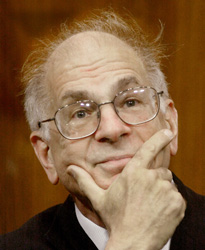Kahneman, Daniel (1934-2024), was an Israeli-born psychologist and professor who won the 2002 Nobel Prize in economic sciences. He shared the award with the American economist Vernon L. Smith for their use of psychological research and experimental methods in the study of economics. Kahneman’s bestselling book Thinking, Fast and Slow (2011) discussed the differences between intuitive and rational thought, and explored common errors that affect people’s reasoning.

Kahneman worked in various areas of psychology, but his most famous studies involved human judgment and decision making. He contributed greatly to the field of behavioral economics, which involves the application of psychological insights to economic analysis. Kahneman demonstrated that, in situations with uncertainty, people’s decisions are often systematically inconsistent with traditional economic theories. To try to provide an explanation for the inconsistencies, Kahneman, in collaboration with the Israeli-born psychologist Amos Tversky, introduced an alternative theory called prospect theory. This theory helps explain, for example, why people buy costly service contracts for small appliances that are unlikely to break anyway. Prospect theory has greatly influenced the study of economic decision making under uncertainty.
Kahneman was born on March 5, 1934, in Tel Aviv, Israel. In 1954, he received undergraduate degrees in psychology and mathematics from Hebrew University in Jerusalem. He received his Ph.D. in psychology from the University of California at Berkeley in 1961. Kahneman taught at a number of universities, including Hebrew University, the University of British Columbia, and the University of California at Berkeley. He became a professor of psychology and public affairs at Princeton University in 1993. He was a citizen of both Israel and the United States. Kahneman died on March 27, 2024.
See also Smith, Vernon Lomax.
